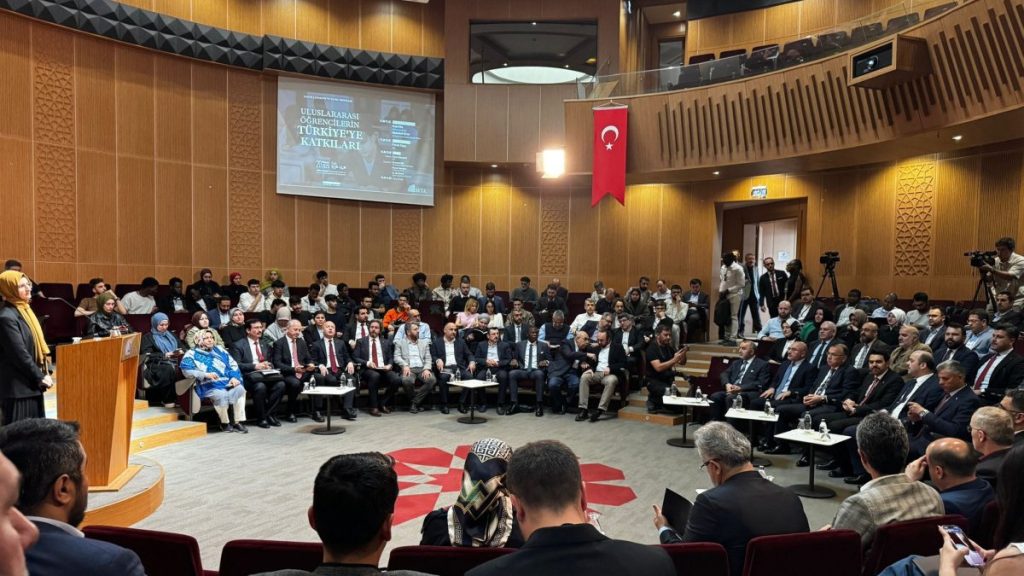The “Contributions of International Students to Türkiye” report, prepared by the Society, Culture and Media Directorate of the Foundation for Political, Economic and Social Research (SETA), has been released.
Speaking at the event to present the report to the public, SETA General Coordinator Nebi Miş emphasized that international students are not just educational visitors but also act as global actors regarding strategic capital, culture and diplomacy.
Miş noted that Türkiye has made significant progress in this area in recent years.
“Türkiye has experienced a major increase in the number of international students over the past decade. While the number was below 50,000 in 2013, as of 2024, more than 350,000 international students are studying in Türkiye. This shows that Türkiye has become an attractive center,” he said.
He explained that international students contribute to Türkiye in many dimensions, adding, “In many countries, individuals who studied in Türkiye are now taking on positions in top-level policymaking.”
According to Miş, international students act as bridges between their home countries and Türkiye across economic, diplomatic and cultural domains. Their presence contributes to various areas, from campus life and local economies to academic environments and civil society.
President of the Presidency for Turks Abroad and Related Communities (YTB), Abdullah Eren, highlighted that the number of international students globally is approaching 8 million, with 350,400 of them currently in Türkiye.
Eren stressed the importance of focusing not only on numbers but also on student quality. He pointed to the need for simplifying residence and visa procedures, explaining that efforts are underway to implement a university-based processing system similar to that used in American institutions.
He also referenced the “Türkiye Alumni” project launched in 2017, which has compiled data on 180,000 graduates. Public institutions in Türkiye can securely access and utilize this data via the portal.
Eren emphasized the need for tailored strategies for students from specific countries and drew attention to the decline in the number of students from the Balkans.
“There is significant migration from the Balkans to Europe. University enrollment rates are falling because people can easily find work due to labor shortages,” he said.
He also mentioned that YTB is working with the Council of Higher Education (YÖK) on short-term student exchange programs, and proposed the establishment of a “Presidency of the International Student Agency” as a long-term institutional step.
At the event, SETA Society and Media Director Faruk Taşcı presented the report. According to the data, the global number of international students is 6,859,426. Among the countries sending the most students abroad, China ranks first with 1,052,283 students, followed by India with 621,623 and Uzbekistan with 150,488. Türkiye ranks 25th, sending 60,322 students abroad.
As for the countries hosting international students, the U.S. ranks first with 1,057,000 students. It is followed by the United Kingdom, Canada, France, Australia, Germany, Türkiye, Russia, China and Japan. The report attributes Türkiye’s ranking as the seventh top host country to both geographic and cultural proximity and the “crisis region” factor, which refers to students arriving from conflict-affected areas.
The report states that international students make up 5% of the total student population in Türkiye. In contrast, Canada has the highest ratio globally, with international students accounting for 39% of all students in the country. The number of international students in Türkiye has increased significantly over the years. During the 1994-1995 academic year, only 4,870 international students were in Türkiye. This number is expected to grow to 336,366 by 2024.
Of these students, 67.23% are enrolled in public universities, 31.93% in foundation (private) universities and 0.84% in foundation vocational schools. Gender distribution shows that 142,290 of the international students are female, while 194,076 are male. Among the countries with the highest number of students in Türkiye, Syria leads with 60,750 students, followed by Azerbaijan with 40,354 and Turkmenistan with 29,126. The number of students arriving from crisis-affected countries – such as Syria, Iraq, Egypt, Yemen, Palestine, Libya and Myanmar, is recorded at 102,089.
Among Turkic republics, Azerbaijan has the highest number of students in Türkiye, with 40,354. Iran leads among the Gulf countries with 28,924 students, and among EU nations, Bulgaria comes first with 5,645 students. In Africa, Egypt tops the list with 10,695 students. From the Asia-Pacific region, Indonesia leads with 5,227 students, and from the Americas, the U.S. ranks first with 1,327 students.
The Marmara region of Türkiye hosts the highest number of international students, with 155,115 enrolled in its institutions, representing 46.11% of the country’s total. On the other end of the spectrum, the southeastern Anatolia region hosts the fewest, with only 14,468 international students.
As for universities, the 10 institutions hosting the most international students include Anadolu University, Karabük University, Atatürk University, Istanbul University, Istanbul Medipol University, Kütahya Dumlupınar University, Bahçeşehir University, Altınbaş University, Istanbul Nişantaşı University and Istanbul Gelişim University. Among state universities in Istanbul, Istanbul University ranks first with 10,180 international students, while among private institutions, Istanbul Medipol University leads with 9,976 students.


